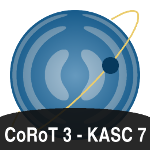The dynamical evolution of planetary systems, after the evaporation of the accretion disk, is the result of the competition between tidal dissipation and the net angular momentum loss of the system. In the case of multiple systems, gravitational interaction between planets must also be taken into account. However, even focusing on single companion systems, the description of the diversity of orbital configurations, and correlations between parameters of the observed system (e.g. in the case of hot jupiters), is still limited by our understanding of the transport of angular momentum within the stars, and its effective loss by magnetic braking.
After introducing the present state of conjectures regarding the observables of the dynamical evolution of extrasolar systems, I will review the important contributions of the space missions CoRoT and Kepler and give a few examples of results allowing to constrain theories of angular momentum evolution and test models of planetary formation. This kind of studies rely on the determination of stellar radii, masses and ages. Major advances will thus be obtained with the results of the PLATO 2.0 mission, selected as the next M-class mission of ESA's Cosmic Vision plan, that will allow the complete characterization of host stars using asteroseismology.
- Presentation
- Video

 PDF version
PDF version

